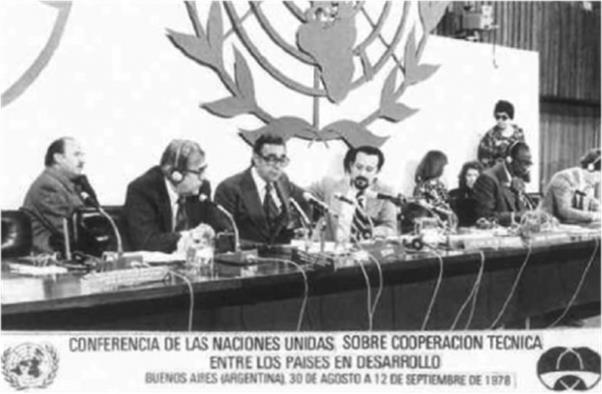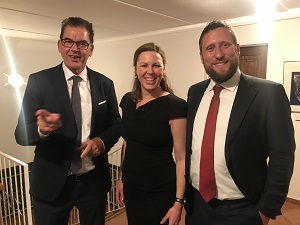
UN adopts draft resolution for South South Cooperation conference in 2019

Edited excerpts from original South Centre article by Adriano José Timossi
“The United Nations General Assembly adopted on 28 August 2017 a draft resolution calling for the organization of the Second High-level United Nations Conference on South-South Cooperation to be held in Argentina in 2019” stated the South Centre this week when announcing the landmark resolution.
The Conference will mark the 40th anniversary of the first UN Conference on Technical Cooperation among Developing Countries also held in Buenos Aires almost forty years ago, a milestone event in the history of the UN and multilateralism.
The draft UN resolution titled “Second High-level United Nations Conference on South-South Cooperation” provionally diarised the second conference for 20 to 22 March 2019 in Buenos Aires.
At the first conference in 1978, the blueprint was established for technical cooperation among developing countries. This framework has guided many of the multi-lateral linkages that has been put in place over the ensuing 40-year period. Dubbed the Buenos Aires Plan of Action for Promoting and Implementing Technical Cooperation among Developing Countries (BAPA), it became a driving force in the strengthening of the role of the UN and the international community to support developing countries’ development.
“The follow-up to BAPA took place through several recommendations, decisions, resolutions and activities undertaken with the aim to promote cooperation among developing countries over the past decades. Many of them were boosted by the robust coordination and unity of the G77 and China and the support of the UN.
For instance, the Nairobi document of the first High-level United Nations Conference on South-South Cooperation held in 2009 in Kenya, endorsed the principles on South-South Cooperation. The Nairobi outcome stressed that “South-South cooperation and its agenda have to be set by countries of the South and should continue to be guided by the principles of respect for national sovereignty, national ownership and independence, equality, non-conditionality, non-interference in domestic affairs and mutual benefit”.
Resolution A/71/318 adopted last week calling for a second UN Conference on South-South Cooperation was negotiated under the outstanding leadership of H.E. Mr. Adonia Ayebare, Permanent Representative of the Republic of Uganda appointed by the President of the General Assembly as the chair of the informal consultations on modalities of the High-level United Nations Conference on South-South Cooperation.
Ambassador Ayebare is also Chair of the High-level Committee on South-South Cooperation, the subsidiary body of the UN General Assembly established to review progress made in implementing the Buenos Aires Plan of Action, the new directions strategy for South-South cooperation and the Nairobi outcome document of the High-level United Nations Conference on South-South Cooperation.
The negotiations to develop the text of the document that will be presented at the 2019 conference will start in November next year and be concluded by the end of February 2019.
The South Centre stated that developing countries need to make sure that the longstanding conceptual framework and principles on South-South Cooperation adopted in several G77 and China meetings will be maintained and enhanced in the final outcome text to be adopted in Buenos Aires.
“In the preparations for the upcoming Second UN High-level Conference on South-South Cooperation, the UN Secretary-General was requested to provide all necessary assistance to the preparatory process and the High-level Conference. This also includes the preparation of a “comprehensive report, consistent with the overarching theme of the Conference, no later than August 2018, reviewing the trends in South-South cooperation and triangular cooperation, including the progress made by the international community, in particular the United Nations, in supporting and promoting such cooperation and identifying new opportunities, as well as challenges and suggestions to overcome them”.
Important to note also that the resolution stresses that “South-South cooperation, as an important element of international cooperation for development, offers viable opportunities for developing countries in their individual and collective pursuit of sustained economic growth and sustainable development”. However, it cannot be seen as a substitute for, but rather a complement to North-South cooperationm, according to the South Centre.
In this very same vein, it is also valuable to remind that the conceptual framework and the set of principles for South-South cooperation contained in the “Yamoussoukro Consensus on South-South Cooperation” which constitutes the very foundation of South-South Cooperation must be respected.
The conceptual framework and set of principles presented below are an important reminder for future work towards a successful outcome of the UN Second Conference on South-South Cooperation that could set the basis for a true agenda for the international community to work together, respecting its differences and making necessary changes in order to create a suitable and inclusive environment for all to achieve the Agenda 2030 for Sustainable Development.
South-South Cooperation Principles*
a. South-South cooperation is a common endeavour of peoples and countries of the South and must be pursued as an expression of South-South solidarity and a strategy for economic independence and self-reliance of the South based on their common objectives and solidarity;
b. South-South cooperation and its agenda must be driven by the countries of the South;
c. South-South cooperation must not be seen as a replacement for North-South cooperation. Strengthening South-South cooperation must not be a measure of coping with the receding interest of the developed world in assisting developing countries;
d. Cooperation between countries of the South must not be analyzed and evaluated using the same standards as those used for North-South relations;
e. Financial contributions from other developing countries should not be seen as Official Development Assistance from these countries to other countries of the South. These are merely expressions of solidarity and cooperation borne out of shared experiences and sympathies;
f. South-South cooperation is a development agenda based on premises, conditions and objectives that are specific to the historic and political context of developing countries and to their needs and expectations. South-South cooperation deserves its own separate and independent promotion;
g. South-South cooperation is based on a strong, genuine, broad-based partnership and solidarity;
h. South-South cooperation is based on complete equality, mutual respect and mutual benefit;
i. South-South cooperation respects national sovereignty in the context of shared responsibility;
j. South-South cooperation strives for strengthened multilateralism in the promotion of an action-oriented approach to development challenges;
k. South-South cooperation promotes the exchange of best practices and support among developing countries in the common pursuit of their broad development objectives (encompassing all aspects of international relations and not just in the traditional economic and technical areas);
l. South-South cooperation is based on the collective self-reliance of developing countries;
m. South-South cooperation seeks to enable developing countries to play a more active role in international policy and decision-making processes, in support of their efforts to achieve sustainable development;
n. The modalities and mechanisms for promoting South-South cooperation are based on bilateral, sub-regional, regional and interregional cooperation and integration as well as multilateral cooperation.
* Taken from paragraph 70 of the Ministerial Declaration adopted by the 33rd Annual Meeting of Ministers for Foreign Affairs of the Group of 77 (New York, 25 September 2009)
Caption
Opening of the first UN Conference on Technical Cooperation among Developing Countries held from 30 August to 12 September 1978 in Buenos Aires, Argentina.











































